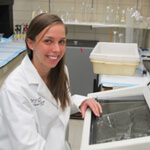
SAN ANTONIO (January 31, 2014) – Ovarian cancer is the deadliest of all gynecological cancers, often difficult to detect and tough to cure in the later stages. It stimulates strong anti-cancer immunity in the body, and yet the body’s immune system is not able to eliminate the cancer because the cancer turns the immunity off.
But a researcher at The University of Texas Health Science Center at San Antonio wants to find out how to turn the body’s own defenses back on to fight ovarian cancer, and has received a $900,000 grant from the Ovarian Cancer Research Foundation to do so.
Tyler Curiel, M.D., M.P.H., an oncologist and internationally recognized immunologist at the Health Science Center’s Cancer Therapy & Research Center, has long focused on this puzzle, and has clinically tested promising therapies that could be highly effective. Standard ovarian cancer treatment combines several approaches, but most immune therapy trials, including his group’s early work, only test one immune treatment at a time.
“As we understand better the immune impediments in ovarian cancer, we can develop a program to combine our most successful approaches,” Dr. Curiel said. “We expect to produce better clinical outcomes while limiting toxicities.”
Dr. Curiel and his team plan to develop effective multi-modal immune therapy for ovarian cancer using approaches in three key areas: reducing immune impediments to ovarian cancer immunotherapy, blocking the molecular mechanisms that drive tumor growth and inhibit anti-tumor immunity, and using new generation adoptive T cell transfers.
“This work will allow development of a major grant from the National Cancer Institute to take these therapies to clinical trials, first in resistant cancers and later in relapse prevention and as treatment after failure of front-line therapy,” Dr. Curiel said. This same approach could also be used to treat several additional cancers, since many use the same strategies that ovarian cancer uses to turn immunity off. “This immunotherapy can be safe, tolerable, effective, quickly translated, applied to a variety of cancers and affordable.”
The Cancer Therapy & Research Center (CTRC) at The University of Texas Health Science Center at San Antonio is one of the elite academic cancer centers in the country to be named a National Cancer Institute (NCI) Designated Cancer Center, and is one of only four in Texas. A leader in developing new drugs to treat cancer, the CTRC Institute for Drug Development (IDD) conducts one of the largest oncology Phase I clinical drug programs in the world, and participates in development of cancer drugs approved by the U.S. Food & Drug Administration. For more information, visit www.ctrc.net.


